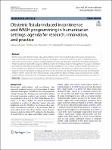Item Infomation
Full metadata record
| DC Field | Value | Language |
|---|---|---|
| dc.contributor.author | Adjorlolo, Samuel | - |
| dc.contributor.author | Ani-Amponsah, Mary | - |
| dc.contributor.author | Hammond, Emily | - |
| dc.date.accessioned | 2023-09-29T08:27:58Z | - |
| dc.date.available | 2023-09-29T08:27:58Z | - |
| dc.date.issued | 2023 | - |
| dc.identifier.uri | https://link.springer.com/article/10.1186/s41018-022-00133-y | - |
| dc.identifier.uri | https://dlib.phenikaa-uni.edu.vn/handle/PNK/9379 | - |
| dc.description | CC-BY | vi |
| dc.description.abstract | Women living with obstetric fistula-induced incontinence (OFII) have heightened need for water, sanitation and hygiene (WASH) services because they experience involuntary leaking of urine, feces, or both. In humanitarian settings where access to WASH services is notably limited, research and innovation relating to OFII and WASH programming has not been granted the requisite attention, relative to menstrual hygiene management. The paper is intended to bring to the attention of humanitarian researchers and practitioners the research needs of women living with OFII. Three thematic areas that have the propensity to arouse interest in this neglected topical issue and help to set the stage for research and actions are discussed. These are the prevalence of OFII, prevention of OFII, and WASH programming for women living with OFII. Empirical studies dedicated to the above thematic issues will generate the needed evidence base to inform decision-making processes relating to improving the WASH needs of women living with OFII. | vi |
| dc.language.iso | en | vi |
| dc.publisher | Springer | vi |
| dc.subject | OFII | vi |
| dc.subject | WASH | vi |
| dc.title | Obstetric fistula-induced incontinence and WASH programming in humanitarian settings: agenda for research, innovation, and practice | vi |
| dc.type | Book | vi |
| Appears in Collections | ||
| OER - Pháp luật - Thể chế xã hội | ||
Files in This Item:

